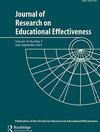A Meta-Analysis of Mathematical Interventions for Increasing the Word Problem Solving Performance of Upper Elementary and Secondary Students with Mathematics Difficulties
IF 1.6
4区 教育学
Q2 EDUCATION & EDUCATIONAL RESEARCH
Journal of Research on Educational Effectiveness
Pub Date : 2022-06-20
DOI:10.1080/19345747.2022.2080131
引用次数: 2
Abstract
Abstract This meta-analysis synthesized the findings of experimental and quasi-experimental studies to determine the efficacy of math interventions for enhancing the word problem-solving accuracy of students with mathematics difficulties in Grades 4 to 12. Further, we identified intervention and design characteristics that moderate the effectiveness of interventions. We appraised study quality using Council for Exceptional Children (CEC's) evidence standards. We also used random-effects meta-regression models with robust variance estimation (RVE) to compute the overall weighted treatment effect and investigate the moderating impact of 15 variables. Results from 36 intervention studies published between 1989 and 2020 reveal a relatively large and positive mean effect size (g = 0.71; SE = 0.11, 95% CI [0.49, 0.92]) across 88 outcomes, suggesting the examined interventions were effective. The moderator analyses' findings showed the treatment efficacy varied as a function of five intervention characteristics, including intervention model, interventionist, grade level, math topic, and intervention duration. None of the design features we examined led to significant moderator effects. We discuss findings and limitations and provide directions for future research and practice.数学干预对提高中小学数学困难学生字问题解决能力的元分析
摘要本荟萃分析综合了实验和准实验研究的结果,以确定数学干预对提高4 ~ 12年级数学困难学生的单词解决准确率的效果。此外,我们确定了干预措施和设计特征,调节干预措施的有效性。我们使用特殊儿童委员会(CEC)的证据标准来评价研究质量。我们还使用随机效应元回归模型和稳健方差估计(RVE)来计算总体加权处理效果,并研究15个变量的调节作用。1989年至2020年间发表的36项干预研究的结果显示,平均效应大小相对较大且为正(g = 0.71;在88个结果中,SE = 0.11, 95% CI[0.49, 0.92]),表明所检查的干预措施是有效的。调节因子分析的结果显示,治疗效果随五个干预特征而变化,包括干预模式、干预者、年级水平、数学主题和干预持续时间。我们研究的设计特征都没有导致显著的调节效应。我们讨论了研究结果和局限性,并提出了未来研究和实践的方向。
本文章由计算机程序翻译,如有差异,请以英文原文为准。
求助全文
约1分钟内获得全文
求助全文
来源期刊

Journal of Research on Educational Effectiveness
EDUCATION & EDUCATIONAL RESEARCH-
CiteScore
4.00
自引率
11.10%
发文量
37
期刊介绍:
As the flagship publication for the Society for Research on Educational Effectiveness, the Journal of Research on Educational Effectiveness (JREE) publishes original articles from the multidisciplinary community of researchers who are committed to applying principles of scientific inquiry to the study of educational problems. Articles published in JREE should advance our knowledge of factors important for educational success and/or improve our ability to conduct further disciplined studies of pressing educational problems. JREE welcomes manuscripts that fit into one of the following categories: (1) intervention, evaluation, and policy studies; (2) theory, contexts, and mechanisms; and (3) methodological studies. The first category includes studies that focus on process and implementation and seek to demonstrate causal claims in educational research. The second category includes meta-analyses and syntheses, descriptive studies that illuminate educational conditions and contexts, and studies that rigorously investigate education processes and mechanism. The third category includes studies that advance our understanding of theoretical and technical features of measurement and research design and describe advances in data analysis and data modeling. To establish a stronger connection between scientific evidence and educational practice, studies submitted to JREE should focus on pressing problems found in classrooms and schools. Studies that help advance our understanding and demonstrate effectiveness related to challenges in reading, mathematics education, and science education are especially welcome as are studies related to cognitive functions, social processes, organizational factors, and cultural features that mediate and/or moderate critical educational outcomes. On occasion, invited responses to JREE articles and rejoinders to those responses will be included in an issue.
 求助内容:
求助内容: 应助结果提醒方式:
应助结果提醒方式:


